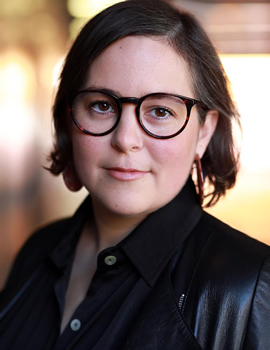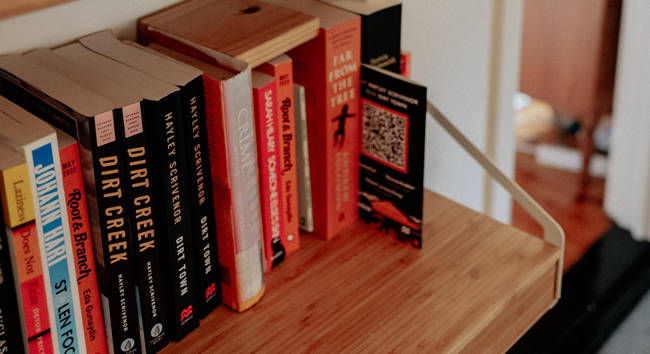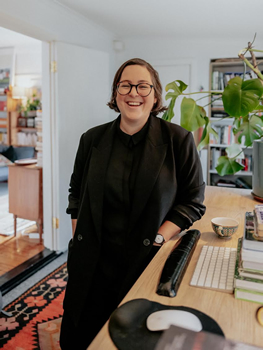Much More Than a Familiar Whodunnit
Haley Scrivenor’s debut adult novel, DIRT CREEK, doesn’t waste any time. By page two the body of Esther, a 12-year-old missing child, is found. But what happened to her, why, and who is responsible for her disappearance and ultimate demise?
It sounds pretty much like a familiar whodunnit, but DIRT CREEK is much more than that. What Scrivenor is really interested in is how the girl’s disappearance affects everyone in this small Australian town.
Told through the voices of Esther’s friends, her parents, the parents of her friends, and Detective Sergeant Sarah Michaels, who’s charged with leading the investigation into the child’s disappearance, this taut, gripping novel is devoted to answering these questions. But along the way, all kinds of small-town secrets are uncovered, the least of which might be how Esther disappeared and who was responsible.
In this exclusive interview with The Big Thrill, Scrivenor shares a little about her writing journey and what led to the writing of her haunting debut, DIRT CREEK.
Tell us a little about your background.

Credit: Life Is Productions
I was born in Wagga Wagga, a regional center in country New South Wales. It’s wheat and canola country: I remember long drives past endless fields and having to hold your breath if the canola was in flower, because it stank. Hot summers, cold winters. It was an hours and hours drive from the nearest capital city. We moved around a lot when I was small, but I lived in a small country town near Wagga Wagga between the ages of six and twelve. I’m sure I’ve said it somewhere, but I try not to name the town, because it’s not their fault that I grew up and became a writer! There’s nothing autobiographical about the story of missing girl Esther Bianchi or some of the more horrible characters we encounter in DIRT CREEK. But I do think the town left a vivid imprint on me. There is something about that physical isolation that I wanted to explore in the novel. It’s also not an accident that the child narrators in my book are twelve or younger: I was twelve when we left and moved to a bigger, coastal city.
What kind of childhood did you have?
Unlike some writers I know, I didn’t grow up wanting to be a writer. I thought you had to be born a writer, that there would be some special birthmark, or you’d get a letter from some kind of central authority. Of course, now I realize the ongoing work of being a writer is finding ways to give yourself permission. I felt at a bit of a loose end as a kid: I knew I wanted to be good at something, but I couldn’t seem to figure out what. There was a time, in my early university days, when I thought I would work with languages somehow: I studied French, Spanish, and Mandarin Chinese in my undergraduate studies. I’ve lost most of the skill I ever had in any of those languages, but I do think they were a way to spend time with words while I was figuring out what I really wanted to do. I think I knew I wanted to be a writer when I realized I could tolerate being bad at it: I was willing to sit there and be awful at it for as long as it took to get better.

Tell us something about Wollongong, where you live, and the Wollongong Writers Festival.
Wollongong is about an hour and a half south of Sydney. It’s on the ocean and also backs onto an escarpment, and I love the landscape here. In the house where I live now, I have the beautiful Mount Keira at my back. I sometimes like to wander outside and just look at it. It makes me feel calm. The mountain is considered a sacred women’s area by the Wodi Wodi people of the Dharawal nation, whose land I live on. As a white writer, descended from British arrivals, I try to remember whose country I’m writing in. Aboriginal people have lived here for thousands of years and continue to fight for and care for the land and waters.
My journey to becoming a writer really began with Wollongong Writers Festival, a local festival for writers and readers where I started out as a volunteer. Meeting writers and realizing that no one had appointed them such, that they had just sat down and started writing, was a revelation to me. I would eventually end up running the festival for a couple of years, as director. It’s given me such an appreciation for the energy that goes into events, and the people who talk about and share books in any capacity. That enthusiasm is infectious, and it’s what the book world runs on.

You had a few stories published and then, while you were getting your PhD, you began a novel. Tell us how that came about.
I’d only had a few very short stories published when I began DIRT CREEK. I actually began with a different novel project in mind. I was stuck trying to write that first idea, so I sat down to work on what was supposed to be a short story about the children of a small country town, coming home from school. I had always been interested in collective narration, when a group of people narrate together. As I was writing the children and all the small details of a place I knew well, the writing just flowed. It occurred to me that if the children were speaking together, they should have a reason for doing so. That was when the idea of the missing girl came to me. I had the idea that I wanted her absence to be at the heart of the book. I’m still surprised that a book that feels so specific, so enmeshed in my experiences of small-town Australia—and that has the POVs that DIRT CREEK has—has had a broader appeal. Not only is it published in the UK, USA, and Australia, but there are several translations in the works.
Was it challenging writing from so many points of view, including the children?

The collective of children were really my entry point to the story. I found Ronnie (Veronica) and Lewis the two easiest characters to write. Probably because Ronnie is very similar to me in personality: She’s a bossy, chubby know-it-all, and she’s also quite gullible, but she loves deeply. Ronnie, though, is probably more comfortable in the small town. Lewis, on the other hand, is a character who feels deeply out of place. I hadn’t even heard the word queer when I was growing up in my small country town, but I gave some of my own fear and confusion to Lewis. And I don’t think it’s too much of a spoiler to say that of all the characters, it was most important to me that Lewis got something that is recognizable as a happy ending. Both these characters love Esther in their own ways. The collective of children are a bit more ambivalent, or there are many different ways they think and feel about this girl who has gone missing. I was interested in capturing something about the way when a crime takes place, it touches a whole range of people, not just those in that person’s immediate circle.
How long did it take you to write DIRT CREEK, and can you tell us about its path to publication?
I began working on the “short story” of DIRT CREEK in 2016, so it took me about six years from first paragraph to published book. I would say it took about four years to get it to the stage where I was shortlisted for a prize, which helped me get an agent. That agent helped me find a publisher here in Australia and representation overseas. Once I sold the book was when it felt like the hard work really began—there were months of edits with editors from different countries. No stone was left unturned. I’ll be forever grateful for that process, but it was grueling.
Tell me something about the part of Australia where it takes place and why you chose to set the novel there.
The town of Durton—which the children call Dirt Town, as a bit of a schoolyard joke—is an entirely fictional town. With that said, it is hot in summer, cold in winter, just like I remember from my childhood. The snacks that the children eat at recess are the ones I remember from my own lunchbox. There is a larger regional town about a half an hour’s drive away. If you want affordable groceries or to see a movie, that’s where you have to go. What was astonishing was that when I was shown the cover of DIRT CREEK for the first time, it felt immediately right. It was exactly the landscape I had pictured. (Durton Creek becomes Dirt Creek, of course, with the same schoolyard logic as above!)
What drew you to the crime genre?

I didn’t imagine I would write crime novels. I thought I would write a meandering, description-filled book about childhood. What I learned about myself while writing DIRT CREEK is that, as a writer, I enjoy knowing more than the reader. And I also think there is something inherently satisfying about the kind of plot you find in books that are categorized as crime: I enjoy offering a resolution for the reader because we so seldom get one in life. I love that crime honors the attentive reader. Nothing is wasted, anything you are told is for a reason. And that’s what I think will keep me coming back to this kind of novel.
What was the biggest challenge you had writing DIRT CREEK?
I loved being professionally edited—it is such a privilege to have minds that are more analytical, more finely honed than your own, go to work on something you wrote. It’s amazing what people are able to see in your work with the benefit of distance. But I would say that the structural edit I did, in the company of three brilliant editors from three different countries, involved the greatest amount of lying on the ground and groaning softly on my part.
Who are your literary influences?
This is a very difficult question to answer, because the books I read, and that make me want to write, are not always books that might seem obvious to readers of my own work. In the first draft stage, I love reading writers who I think of as maximalists: Donna Tartt, Michelle de Kretser, Hanya Yanigihara, Karl Ove Knausgaard. There is something about not just the language and the level of detail they summon, but the way their writing just gets me excited about how much there is to say about being alive. Then, when I’m trying to think more structurally, I love taut fiction where every single detail matters, where you get the kind of answers you don’t always get in real life, so: Garry Disher, Jane Harper, Tana French. I am also a voracious reader of nonfiction. I envy non-fiction writers because I could never do what they do. I need the plausible deniability that writing fiction provides!
What’s next?
My next book will not be a follow-up to DIRT CREEK. I’m superstitious about projects until they are very far along, but I will say that this next book scares me in the same way my first book did, which I’m hoping is a good sign.
Anything else you’d like to add?
I’m proud of this book, but I always, always make sure to tell people that when I was writing it, it never once felt like I was doing it “right.” Any act of creation is uncomfortable. Writing can feel strange and jerky and not what you intended. I always come back to the idea that if you love something enough, it’s worth doing imperfectly.

